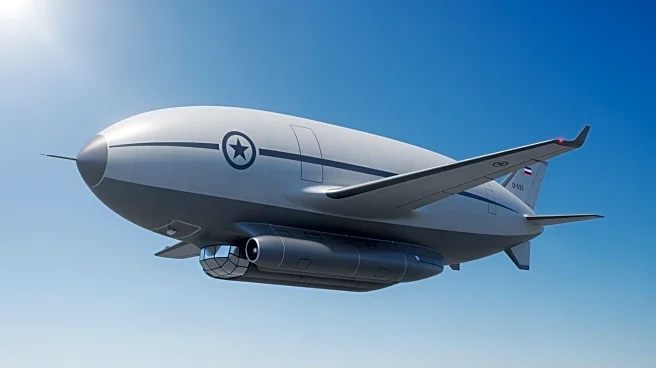What's Happening?
Hybrid Air Vehicles (HAV), a UK-based company, has announced that it has secured its first military client for the Airlander 10 hybrid airship. The company revealed that three airships have been reserved
for use by an undisclosed military entity. This development follows a memorandum of understanding signed in September 2023 with BAE Systems to explore military applications of the Airlander 10. The Airlander 10, known for its fuel efficiency and dual-use applications, can remain airborne for up to five days and is equipped with computing, communications, surveillance, and reconnaissance capabilities. It can operate from any reasonably flat surface, including water, with minimal infrastructure, offering significant mobility and flexibility for maritime, coastal, and land-based expeditionary warfare.
Why It's Important?
The reservation of Airlander 10 airships for military use marks a significant milestone for Hybrid Air Vehicles, potentially expanding its market into defense logistics. The airship's ability to carry up to a 10-tonne logistics payload offers a longer-range, lower-cost, and higher-capacity air transport solution compared to current military transport helicopters. This development could influence military strategies by providing a sustainable and tactical airlift capability, enhancing operational efficiency in areas where traditional platforms face challenges. The Airlander 10's versatility and efficiency could lead to increased adoption in defense sectors, impacting military logistics and operations.
What's Next?
While HAV has not disclosed whether the recent reservation is directly linked to its previous agreement with BAE Systems, the company may continue to explore further military applications for the Airlander 10. Future developments could include the introduction of larger platforms like the Airlander 50 and Airlander 200, which promise low-cost, sustainable tactical and strategic airlift capabilities. As HAV expands its defense portfolio, potential reactions from military stakeholders could include increased interest in hybrid airship technology for various defense applications.
Beyond the Headlines
The introduction of hybrid airships into military operations could have broader implications for defense strategies, particularly in terms of sustainability and cost-efficiency. The Airlander 10's ability to operate with minimal infrastructure may lead to shifts in how military logistics are managed, potentially reducing reliance on traditional transport methods. Additionally, the environmental benefits of fuel-efficient hybrid airships could align with global efforts to reduce carbon footprints in military operations.








